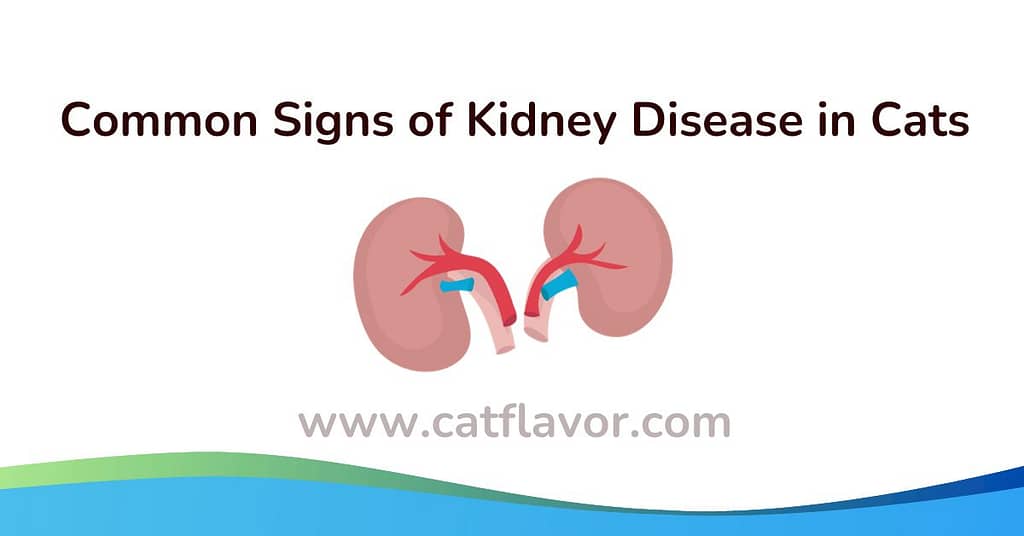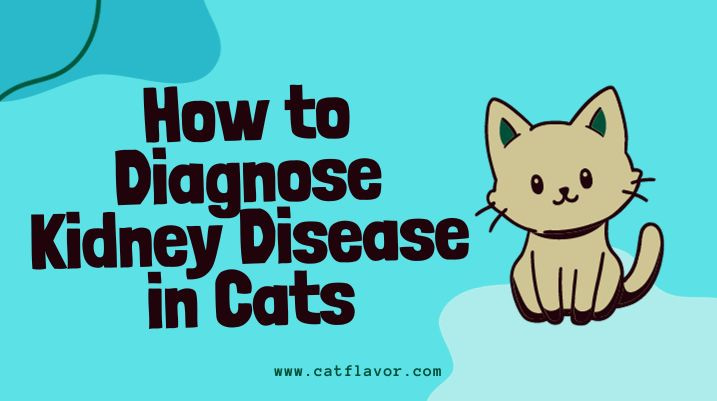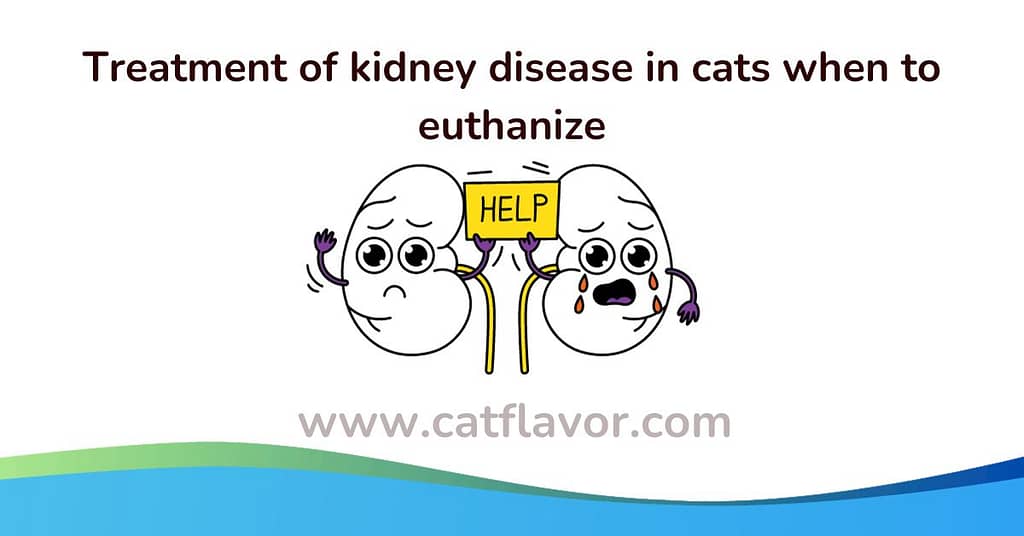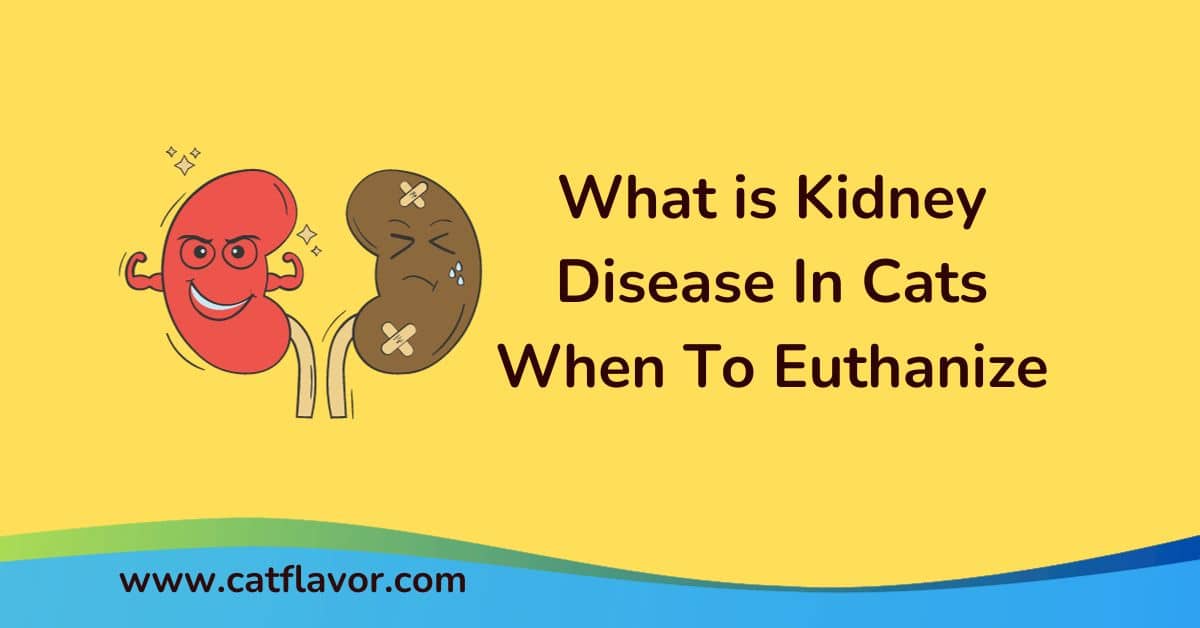Kidney Disease In Cats When To Euthanize
What is Kidney Disease In Cats and When To Euthanize is a complex and common condition for our furry friends. As loving pet owners, it breaks our hearts to see our cats deal with this crippling illness. A lot of the time, we are faced with the scary question: What is Kidney Disease In Cats When To Euthanize? No one likes to ask this critical question, but we must because we love and care about our feline family members.
This article will talk about the complex and emotional topic of kidney disease in cats and the things that might make someone decide on euthanasia, which is a very personal choice. As you deal with this challenging part of cat health care, we want to give you information, help, and understanding so that your decisions are based on love and what’s best for your furry friend.
What is Feline Renal Disease
Feline renal disease, sometimes called kidney disease, is common in cats and worsens over time. It’s essential to fully understand this illness before getting into the complicated question of when to consider suicide. In this part, we’ll talk about what feline renal disease is, what causes it, how it shows up, and its stages. With this basic information, you can make intelligent choices about caring for your cat and improving its quality of life.
When to euthanize a cat with IBD
It is complex and very personal to decide when to put a cat with Inflammatory Bowel Disease (IBD to sleep.) It would help if you talked to a vet about this choice. This choice depends on many things, and you should consider your cat’s general health, response to treatment, and quality of life. Here are some general tips and things to think about:
Symptom Severity:
Think about how bad your cat’s symptoms are. IBD can lead to problems like diarrhea, vomiting, losing weight, and pain that won’t go away. It might be worth considering if these signs are serious or significantly affecting your cat’s quality of life.
Response to Treatment:
Think about how the treatment has gone for your cat. If the medicine your cat is taking for IBD isn’t helping and the symptoms keep getting worse, it could mean that the disease is getting out of hand.
Discomfort and Pain:
Cats with severe IBD may feel pain and discomfort. If the pain your cat is in can’t be controlled or relieved with medicine, that might affect your choice.
Chronic Nature of the Disease:
IBD is a long-term disease that may need ongoing medication, changes to the pet’s diet, and regular trips to the vet. If this looks serious, think about it.
Quality of Life:
Think about how good your cat’s life is in general. Think about how well they can do regular cat things, how hungry they are, and how much they enjoy life. If your cat’s quality of life has worsened, consider their health.
Advice from a Veterinarian:
Talk to your vet or a veterinary specialist in internal health. They can give you essential information about your cat’s health and help you choose.
Individual Preferences:
Your values and tastes are also fundamental. Think about what you think is best for your family and cat. When you euthanasia your pet, you should always do it out of kindness and what’s best for them.
Read Also: Best Vacuum For Cat Litter
Signs & Symptoms of kidney disease in cats when to euthanize
When cats have kidney disease, the symptoms can be different based on how bad the disease is and what stage it is in. Putting down a cat with kidney disease is a tough choice that should only be made after talking to a vet. Here are some common signs that your cat has kidney disease and things you should think about when choosing to put them down:
Common Signs of Kidney Disease in Cats:

Increased Thirst and Urination:
One of the first signs is more urination and thirst. A cat drinks and pees more than usual when it has kidney disease.
Decreased Appetite
Cats with kidney disease may lose their appetite, which can cause them to lose weight.
Vomiting:
Chronic vomiting is a common sign that is often linked to kidney disease.
Lethargy:
Cats affected may feel tired and not have as much energy as usual.
Poor Coat Condition:
If the cat doesn’t get groomed as often, its coat may look dirty and dull.
Bad breath:
Cats with kidney disease may get breath that smells bad.
Oral Ulcers:
You can get mouth sores and oral ulcers.
Dehydration:
Kidney disease can make you lose water, making your eyes look droopy and your gums dry and sticky.
High Blood Pressure:
Kidney disease and high BP may go hand in hand, which can cause problems.
Factors to Consider When Deciding When to Euthanize

Quality of Life:
Think about how good your cat’s life is in general. Are they in pain or having trouble? Would they still be able to enjoy life and act like cats?
Response to Treatment:
Think about how the treatment has gone for your cat. It could be a cause if the disease worsens despite medical treatment.
Severe Symptoms:
If your cat has severe, uncontrolled symptoms that significantly affect their health, consider it.
Late-Stage Kidney Disease:
When kidney disease is terrible, euthanasia may be the only reasonable way to end the pain.
Advice from a Veterinarian:
Talk to your vet. They can tell you more about your cat’s health and help you make an informed choice.
Personal Preferences:
It’s vital that you know and respect your own beliefs and choices. Think about what you think is best for your family and cat.
How to Diagnose Kidney Disease in Cats

Physical Examination:
The first thing your vet will do is give your cat a physical check. They might look for signs of being thirsty, losing weight, or having problems with your teeth.
Blood Tests:
Blood urea nitrogen (BUN) and creatinine levels are significant for finding out if someone has kidney disease. High amounts of these chemicals can be a sign of kidney problems.
Urinalysis:
A urinalysis checks the amount of protein or blood in the urine and other things connected to kidney function.
Imaging:
Imaging tests like X-rays or ultrasound may be used to check the kidneys’ size and shape.
Biopsy:
In some cases, a kidney biopsy is needed to find out the exact reason and level of kidney disease.
Prevention and Management of Kidney Disease in Cats:
Regular Veterinary Check-Ups:
Take your cat to the vet for regular check-ups to monitor its health and catch kidney disease early.
Hydration:
Always make sure your cat can get clean, fresh water. Please set up a water machine or add more water to their food to get them to drink.
Balanced Diet:
Feeding your cat a good, well-balanced food for their kidneys is essential. Cats with kidney problems can eat special diets made just for them.
Medication:
If your cat has kidney disease, follow your vet’s instructions for their recommended medicines and treatment plans. Taking medications can help control symptoms and slow the disease’s growth.
Monitoring Blood Pressure:
Check your cat’s blood pressure often because high blood pressure can be a sign of kidney disease.
Weight Management:
Take care of your cat’s weight so it stays healthy. Extra weight can put stress on the kidneys.
Low-Stress Environment:
Give your cat a setting that is low in stress. Some health problems can get worse when you’re stressed.
Prevent Toxins:
If you don’t want to hurt your cat’s kidneys, keep them away from common toxins like antifreeze, flowers, and some plants.
Regular Exercise:
To keep your cat healthy, give it light exercise every day.
Early Intervention:
If your cat has been identified with kidney disease, you should start treating it immediately and closely monitor it.
Treatment of kidney disease in cats when to euthanize

Cats with kidney disease are treated differently, and the decision to put them down depends on how far along and how bad the disease is, as well as the cat’s general health. Here is a list of treatment choices and things to think about if you are thinking about euthanasia:
Treatment of Kidney Disease in Cats:
Dietary Management:
Special diets for kidneys are meant to make them work less hard and improve their general health. These diets can help you manage your symptoms and slow the disease’s growth.
Fluid Therapy:
Fluid therapy may be needed in some situations, especially for cats with terrible kidney disease. Giving fluids under the skin at home can help you stay hydrated.
Medications:
Medications like antiemetics, antacids, and phosphorus binders can help the cat deal with its symptoms and live a better life.
Blood Pressure Control:
Hypertension, or high blood pressure, can happen with kidney disease and may need medicine.
Regular visits to the vet:
Check-ups are essential to monitor the cat’s health, make any necessary treatment changes, and determine their quality of life.
When to Think About Euthanasia
Choosing to put down a cat with kidney disease is a very personal and challenging choice. Several things can affect this choice:
Quality of Life:
Think about how good your cat’s life is in general. Think about how they feel, how much pain they are in, and how well they can do regular cat things.
Response to Treatment:
Look at how the treatment has gone for your cat. It might be worth thinking about if the disease is getting worse despite medical treatment and is causing a lot of pain.
Symptom Severity:
If your cat is severely dehydrated, losing a lot of weight, or being in a lot of pain and you can’t control it, this may play a role in your choice.
Advice from a Veterinarian:
Talk to your vet about your cat’s health and situation for professional advice.
Preferences of Individuals:
Your ideas and preferences are fundamental. Think about what you think is best for your family and cat.
Conclusion
Cats with kidney disease are hard to take care of and hurt mentally. To keep your cat’s quality of life high, this condition must be treated with medicine, better nutrition, and close supervision. When thinking about euthanasia, it is a very emotional choice that should be based on your cat’s health.
Some treatments can help cats with kidney disease, but it’s essential to think about how well they work and how they will affect your cat’s comfort and pleasure. When making this hard choice, you need to be kind and careful and base your choice on what your vet tells you and your values.
In the end, the health and happiness of your pet cat should be the most important thing. Your vet can give you much helpful information to help you through this challenging process. Enjoy the times you’ve spent with your cat, and make sure your choice is based on love and what’s best for them.

